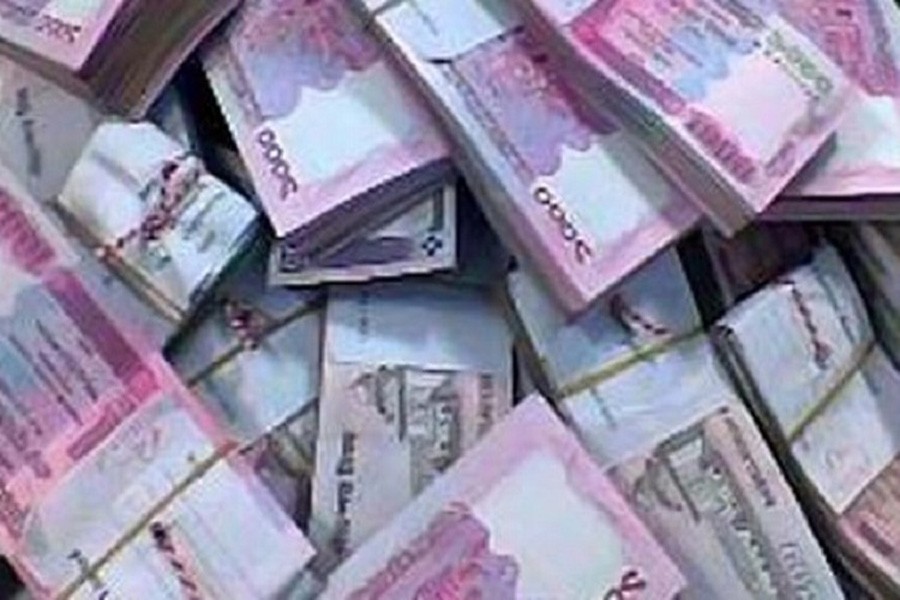Overall excess liquidity with country's commercial banks increased, as of June, for a lending downturn.
Sources in banking circles find two cardinal causes --- lower credit growth, particularly in the private sector, and lesser government borrowing from the banking system --- for the rise in excess liquidity.
They said suspension of government borrowing from the banking system partly contributed to the surge in excess liquidity with the banks.
The volume of excess liquidity rose to Tk 1.06 trillion in the last week of June from below Tk 1.0 trillion in May, officials said.
It was Tk 1.23 trillion in the last week of December 2016, according to statistics with the Bangladesh Bank (BB).
"Most of the excess liquidity has already been invested in the government-approved securities and BB bills as a risk-free investment for the banks," a senior official of the central bank told the FE.
He also said the banks may use the invested liquidity in BB bills as loan-able funds after maturity of the short-term security.
Total outstanding amount of the BB bills stood over Tk 250 billion as on August 06, according to BB's confidential report on the financial front.
Currently, three BB bills are transacted on auction as monetary-policy instruments to adjust money supply to the market.
The BB bills have 07-day, 14-day and 30-day maturity periods.
Under the existing provisions, the auction of BB bills will be held each working day in line with the central bank's requirement.
However, excess reserves, generally known as excess over daily minimum cash reserve requirement (CRR) with the central bank, rose to around Tk 46 billion during the period under review from Tk 42 billion, according to the central banker.
The official believes that the overall excess liquidity may increase further in the country's banking system in the months ahead if the suspension of government bank borrowing continues.
The government has made a pause in fresh borrowing from the banking system through cancelling auctions of its securities since July 23 to ensure proper cash management. The suspension will continue until August 31.
Such latest move of the government came against the backdrop of accumulation of liquidity in hand of late, the central banker explained.
Currently, the government is holding around Tk 40 billion in excess liquidity in its coffers.
Talking to the FE, another BB official said higher sales of savings instruments alongside a rising trend in revenue collection pushed up government's surplus liquidity balance.
Such excess liquidity has also prompted the government to cut down borrowings from the banking system, the central banker said.
Meanwhile, private-sector credit growth decreased further in June owing to lower trade financing for settling import-payment obligations, according to bankers.
The growth in credit flow to private sector came down to 15.66 per cent in June 2017 on a year-on-year basis, lower than the target set by the BB earlier, from 16.03 per cent last May, the BB data showed.
The credit-growth was 16.21 per cent in April.
"Demand for credits decreased slightly in the months of May and June mainly due to the national budget for the next fiscal year," a senior executive of a leading private commercial bank told the FE.
Businesspeople normally maintain a 'go-slow' policy ahead of the budget, he said, adding that the private-sector-credit growth might have taken an upturn in July.
The central bank had projected in its second half-yearly (H2) monetary-policy statement for the fiscal year (FY), 2016-17 that the private credit would grow at 16.50 per cent in June 2017.
However, the total outstanding loans with the private sector rose to Tk 7760.59 billion in June 2017 from Tk 7588.50 billion a month ago. It was Tk 6710.09 billion in June 2016.
"Nothing to worry about lower private-sector-credit growth than that of the ceiling for June," another BB official said while explaining the main objective of the credit-growth ceiling.
He also said the central bank estimates the ceiling of the private- sector credit considering country's overall economic growth, set by the government each year.
The central banker expects that the country will be able to achieve 7.4 per cent gross domestic product (GDP) growth by the end of this fiscal with the private-sector-credit growth ceiling set by the BB in its latest monetary policy.
The BB had projected in its first half-yearly (H1) monetary- policy statement for the FY18 that the private-sector credit would grow at 16.2 per cent in December 2017 and 16.3 per cent in June 2018 respectively.
"It's a temporary phenomenon. We have to wait another one or two months for knowing actual causes of the lowering of private-sector-credit growth," Syed Mahbubur Rahman, managing director and chief executive officer of Dhaka Bank Ltd, told the FE Monday.
He also said the money market may see a tight situation by the end of this month due to the upcoming Eid-ul-Azha festival despite a rising trend in excess liquidity.
Echoing Dhaka Bank CEO's predictions on the money market, another BB official said the central bank may use its monetary instruments to keep the market stable before the holy fiesta.
Normally, short-term borrowings increase before Eid amid a growing demand for money from the banks, as festivals and seasonal trade are associated with the occasion.


